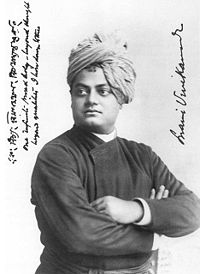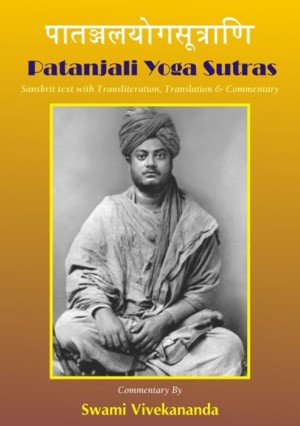45. स्थरस्वूऩसूक्ष्मान्वमाथूवत्त्वसंमभाद्भयूतजम् ॥४५॥
sthūla-svarūpa-sūkṣma-anvaya-arthavattva-saṁyamāt bhūtajayaḥ ||45||
By making Samyama on the elements, beginning with the gross, and ending with the superfine, comes mastery of the elements.
The Yogi make Samyama on the elements, first on the gross, and then on the finer states. This Samyama is taken up more by a sect of the Buddhists. They take a lump of clay, and make Samyama on that, and gradually they begin to see the fine materials of which is is composed, and when they have known all the fine materials in it, they get power over that element. So with all the elements, the Yogi can conquer them all.
46. ततोऽणिभाणदप्रादुबाव्य कामसंऩत तद्धभा्नणबघातिय ॥४६॥
tato-'ṇimādi-prādurbhāvaḥ kāyasaṁpat tad-dharānabhighātśca ||46||
From that comes minuteness, and the rest of the powers, “glorification of the body,” and indestructibleness of the bodily qualities.
This means that the Yogi has attained the eight powers. He can make himsef as light as a particle, he can make himself huge, as heavy as the earth, or as light as the air; he will rule everything he wants, he will conquer everything he wants, alion will sit at his feet like a lamb, and all his desires be fulfilled at will.
47. ूऩरावण्मफरवज्रसंहननत्वाणन कामसंऩत ॥४७॥्
rūpa-lāvaṇya-bala-vajra-saṁhananatvāni kāyasaṁpat ||46||
The glorifications of the body are beauty, complexion, strength, adamantine hardness.
The body becomes indestructible; fire cannot injure it. Nothing can injure it. Nothing can destroy it until the Yogi wishes. “Breaking the rod of time he lives in this universe with his body.” In the Vedas it is written that for that man there is no more disease, death or pain.
48. र्ग्हिस्वूऩाणस्मतान्वमाथवत्त्वसंमभादय ्इणिमजम् ॥४८॥
grahaṇa-svarūpa-asmitā-avaya-arthavattva-saṁyamāt-indriya jayaḥ ||48||
By making Samyama on the objectivity, knowledge and egoism of the organs, by gradation comes the conquest of the organs.
In perception of external objects the organs leave their place in the mind and go towards the object; that is followed by knowledge and egoism. When the Yogi makes Samyama on these by gradation he conquers the organs. Take up anything that you see or feel, a book, for instance, and first concentrate the mind on the thing itself. Then on the knowledge that it is in the form of a book, and then the Ego that sees the book. By that practice all the organs will be conquers.
49. ततो भनोजणवत्व ं णवकयिबाव् प्रधानजमि ॥४९॥
tato mano-javitvaṁ vikaraṇa-bhāvaḥ pradhāna-jayaś-ca ||49||
From that comes glorified mind, power of the organs independently of the body, and conquest of nature.
Just as by the conquest of the elements comes glorified body, so from the conquest of the mind will come glorified mind.
50. सत्त्वऩुषान्यताख्याणतभात्रस्य सवबावाणधष्ठातृत्वंयसव ातृत्वंयच॥५०॥
sattva-puruṣa-anyatā-khyātimātrasya sarva-bhāvā-adhiṣṭhātṛtvaṁ sarva-jñātṛtvaṁ ca ||50||
By making Samyama on the Sattva, to him who has discriminated between the intellect and the Purusa comes omnipresence and omniscience.
When we have conquered nature, and realised the difference between the Purusa and nature, that the Purusa is indestructible, pure and perfect, when the Yogi has realised this, then comes omnipotence and omniscience.
 Swami Vivekananda
Swami Vivekananda
